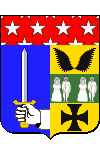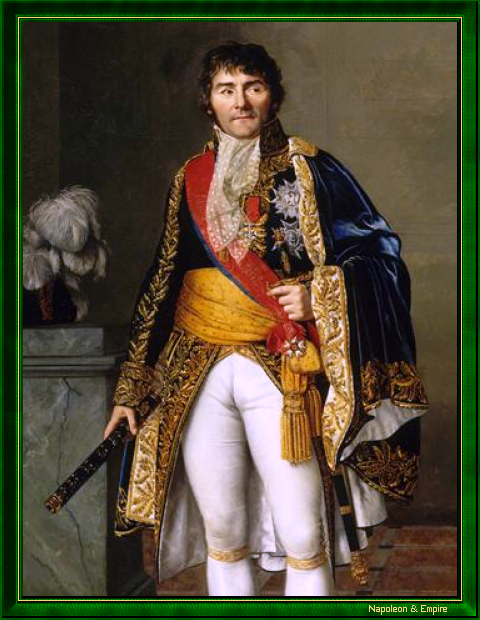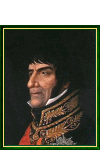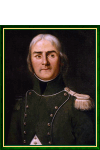Duke of Dantzig (also spelled Dantzick)
Pronunciation:

Born in Rouffach, Alsace on October 25, 1755 and orphaned at eight, Lefebvre was raised by an uncle who hoped he would enter the seminary, being a priest himself. However, the young François Joseph Lefebvre aspired to a career in the military and with the permission of his uncle he joined up in 1773 as a soldier in the French Guards.
By 1788 he was a Sergeant, and on July 14, 1789 he saved the lives of several of his officers.
Promoted to Drill Lieutenant in the National Guard, he distinguished himself for his remarkable loyalty to the monarchy. He was injured while protecting the royal family's return after attempting to escape via Saint-Cloud (April 18, 1791). He also aided the escape of Louis XVI's aunts.
He was transferred to a line regiment and promoted to Captain when war was declared in 1792. By the end of 1793 he was a Brigadier General and in 1794, a général de division (Major General). Assigned to the Rhine and Moselle Armies, he served successively under Louis Lazare Hoche (who he had trained as an instructor with the French Guards), Jean-Baptiste Jourdan and Jean-Baptiste Kléber.
Between 1793 and 1799 he took part in all the major battles: Geisberg (December 26, 1793), the capture of Arlon (April 18, 1794) and of Dinant (May 29), Fleurus (June 26), Altenkirchen (June 4, 1795), Wetzlar (June 15), Friedberg (July 10), and the crossing of the Rhine at Neuwied (April 18, 1797). He became the first Republican general to successfully cross the Rhine.
He left the front after sustaining a serious injury at Pfullendorf on March 21, 1799.
When the Directory was reinstated, he was named Commander of the 17th Military Region which included Paris and the area around the capital. His connection to Bernadotte and Jourdan confirmed him as a fervent republican. Some time earlier, he had been designated as a candidate for a Directorship by the Council of Five Hundred even though he had not been chosen by the Ancients.
He was enthralled by Napoleon Bonaparte's charisma to whom he offered his support. He played a pivotal role in the coup d'état of 18 and 19 Brumaire (November 9-10, 1799 in the French Republican Calendar). In fact, Lefebvre ordered Leclerc to evacuate the legislature assuring the success of a poorly executed plan.
Napoleon Bonaparte, who never failed to reward success, made him a Senator in December 1799 and gave him the title of Marshal in 1804 (along with three other Senators: Kellermann, Pérignon and Sérurier, in contrast to the 14 other Marshalates which were awarded to Generals on active duty). However, Napoleon probably held some doubts concerning Lefebvre's military capabilities, despite being an excellent instructor, since he kept Lefebvre away from the battlefield until 1806 and the beginning of the German Campaign.
After fighting at Jena, he was ordered to take Dantzig. He was supported in the mission by respected officers who played definitive roles in the eventual victory: Drouet d'Erlon was his Chief of Staff, Chasseloup-Laubat commanded the siege, Kirgener the military engineers, and Lariboisière the artillery. The army was a mix of insubordinate and lazy troupes from France, Poland, Saxony and Baden.
According to reports, Lefebvre set about the task with tireless energy: Brake open the walls and I'll go through.
He was continually among his soldiers even at the most dangerous points. The siege lasted from March 12 until May 24, 1807. The city capitulated soon after the arrival of Marshal Mortier's reinforcements.
For this victory, Lefebvre was given "a book of chocolate" (the packet contained 300 000 francs) from the Emperor himself and he received the first Dukedom created by Napoleon I.
The Duke of Dantzig (or Dantzick, as he spelled it) did not rest for long; soon after, he left for Spain where he served from September to December 1808. He was the victor at Durango on October 13. He took Bilbao and Santander and fought the English at Guenes (November 7), Valmaceda (November 8) and captured Segovia on December 3.
On his way to Germany to take command of the Bavarian troops, he was tasked with putting down the insurrection in Tyrol led by the innkeeper and patriot Andreas Hoffer. He was beaten at Steinach on August 11, 1809.
He returned to command only in 1812 when he was assigned to the Old Guard during the Russian Campaign. He had few opportunities to see action at the head of the unit as Napoleon I handled it particularly carefully. However, he earned the admiration and respect of his peers when he walked on foot with his soldiers during the retreat despite his 60 years and his infirmities. He also allowed himself to criticize the Emperor's advisers for the first time: A group of fools who refuse to tell him the truth.
Morally and physically exhausted, he did not take any part in the operations in 1813 but was recalled one last time in 1814 by a desperate Napoleon I. He again commanded the Old Guard for 20 days appearing at Champaubert (February 10, 1814) and Montmirail (February 11) and took part in his last battle at Montereau on February 18.
On April 2, 1814, he voted for the removal of the Emperor in the Senate. On April 4, he was present when Napoleon I abdicated before Macdonald. Then on April 24, he gave his respects to Louis XVIII with eight other Marshals (Berthier, Brune, Macdonald, Marmont, Moncey, Mortier, Ney and Soult) who made him a Peer of France.
The Duke of Dantzig devoted his final years to the commune of Combault where he owned a château and had been mayor since 1813.
He died of dropsy in his Paris residence on the rue Joubert on September 14, 1820. His magnificent tomb is located in Paris, in the 28th division of the Père Lachaise Cemetary
"Marshal Lefebvre, Duke of Dantzig" painted in 1807 by Césarine Davin born Mirvault (Paris 1773 - Paris 1844).

When Lefebvre and his wife first joined Napoleon's court, the Emperor was shocked by the Marshal's boorish manners and his wife's lack of sophistication, the famous Mrs. Inconsiderate, a former washerwoman. However, the Marshal, as uncouth as he was, knew how to defend himself against attacks from members of the ancient nobility. On one occasion, one of these was boasting of his family’s unbroken line to which Lefebvre famously replied: Don't be a proud as all that. I'm an ancestor as well you know.
A statue of the Duke of Dantzig by Alexis André honouring his memory can be found on the north side of the Louvre on the Rue de Rivoli
Freemasonry: Marshal Lefebvre was a member of the "Les Amis Réunis" ("Friends United") Lodge in Mayence before joining the "L'Abeille Impériale" ('The Imperial Bee") in Paris. He was named Honorary Grand Hospitaller of the Grand Orient of France in 1804.

